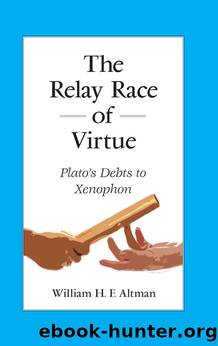The Relay Race of Virtue by William H. F. Altman;

Author:William H. F. Altman;
Language: eng
Format: epub
Publisher: State University of New York Press
Published: 2022-01-15T00:00:00+00:00
In this light, we are Xenophonâs friends, and he wrote for our children. My father recommended âThe Retreat of the Ten Thousandâ to me as a boy; I imagined at the time I had something better to read.
Delebecque devotes three chapters to the years in Skillus, and this creates a tripartite division within the middle part of my own. His central chapter locates the composition of Hellenica II in the middle of this middle period (379â78); the two flanking chapters describe respectively an âearly middleâ (388â379) and a âlate middleâ period (377â71). What makes this tripartite division useful is that it can be better applied to Xenophonâs âearlyâ period, with which this section will conclude, it being the most complex. Delebecque, by contrast, regards only two works as having been written pre-Skillus: Hellenica I before he left Athens, and Cynegeticus while he was, as it were, âon the roadâ (394â388); this notion will likewise prove useful. In general, Delebecqueâs âearly middleâ period becomes very busy, and to it he assigns the composition of The Constitution of the Spartans, Anabasis as a unity (excepting only the Skillus passage), and the following among the Socratic writings: the redaction of the Apology of Socrates, Memorabilia IâII, and Oeconomicus I (up to the entrance of Ischomachus). He places the composition of On Horsemanship here as well. Guiding and vitiating his account is an ongoing reliance on the axiom of Literary Rivalry, and he notes without refuting the position of von Arnim with regard to the priority of Xenophonâs Apology.116 An examination of Delebecqueâs text should in any case satisfy the reader that anyone who attempts to reconstruct Xenophonâs life on the basis of his writingsâand that means anyone who tries to reconstruct his lifeâwill necessarily incur a criticâs contempt, thanks to the curious mixture of informed insight and pure speculation that such a project inevitably entails.117
Despite a huge difference with regard to SymposiumâDelebecque places it in Xenophonâs âlateâ period while I regard it as either âlate earlyâ or âearly middleââthere is also considerable overlap. Xenophon very probably did compose Hellenica II in Skillus, and if not Anabasis I, it was at least Anabasis II that he did write here. Since I donât divide Oeconomicus in twoâlocating the composition of its second part in Athens since it is so conspicuously set thereâthe whole of it can be assigned to this period on the basis of Xenophonâs contemporaneous agricultural activities. The fact that he was now raising children justifies dating the composition of Memorabilia II to this period, especially on the basis of the immortal 2.2. And the need to educate his sons (and entertain Philesia) connects at the very least the oral origins of Cyropaedia to this happy and tranquil interlude. It is easy to imagine Xenophon, finally possessed of ample leisure, now finally able to indulge his literary pursuits.
But such an image obscures some basic facts. To begin with, Greek warfare was largely a seasonal affair, leaving the writer-warrior ample time for reflection and
Download
This site does not store any files on its server. We only index and link to content provided by other sites. Please contact the content providers to delete copyright contents if any and email us, we'll remove relevant links or contents immediately.
The remains of the day by Kazuo Ishiguro(8349)
Tools of Titans by Timothy Ferriss(7758)
Giovanni's Room by James Baldwin(6769)
The Black Swan by Nassim Nicholas Taleb(6732)
Inner Engineering: A Yogi's Guide to Joy by Sadhguru(6417)
The Way of Zen by Alan W. Watts(6264)
Asking the Right Questions: A Guide to Critical Thinking by M. Neil Browne & Stuart M. Keeley(5328)
The Power of Now: A Guide to Spiritual Enlightenment by Eckhart Tolle(5307)
The Six Wives Of Henry VIII (WOMEN IN HISTORY) by Fraser Antonia(5203)
Astrophysics for People in a Hurry by Neil DeGrasse Tyson(4981)
12 Rules for Life by Jordan B. Peterson(4150)
Housekeeping by Marilynne Robinson(4034)
The Ethical Slut by Janet W. Hardy(4018)
Skin in the Game by Nassim Nicholas Taleb(3951)
Double Down (Diary of a Wimpy Kid Book 11) by Jeff Kinney(3888)
Ikigai by Héctor García & Francesc Miralles(3843)
The Art of Happiness by The Dalai Lama(3827)
Skin in the Game: Hidden Asymmetries in Daily Life by Nassim Nicholas Taleb(3707)
Walking by Henry David Thoreau(3667)
